History
Then and now: how the School has changed over time
1918 – The Nuremberg Commercial College is established
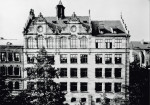
The School’s history goes back to the 19th century. At that time there were plans to establish colleges for the new fields of business and engineering in Nuremberg. However, it was not until May 27, 1918 that the Nuremberg Commercial College was established in the form of a foundation. Having received approval from Nuremberg city council and the responsible ministry, the College began teaching its first 180 students at Findelgasse 7 in the winter semester of 1919/20.
1923 – Famous representatives join the College
The number of students at the college continued to grow. The student with registration number 9 who completed his degree in 1923 was Ludwig Erhard, who later became the second Chancellor of West Germany. Around the same time, Wilhelm Rieger, who taught Ludwig Erhard, began making a name for himself and shaped the teaching and research in business administration at the College. He achieved this in collaboration with Wilhelm Vershofen, who later established Gesellschaft für Konsumforschung (GfK). With their research findings they helped the Nuremberg Commercial College develop a strong reputation.
1925 – The College receives the same rights as universities
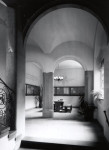
In 1925, two major changes happen at the College. Firstly, it was granted equivalent status to the other universities in Germany. The College was granted the right to award habilitations in business administration in 1927, the right to award doctoral degrees in 1931, and the right to award habilitations in all of its subjects in 1931. Secondly, the name of the Nuremberg Commercial College received the addition ‘College for Business, Economics and the Social Sciences’. During the National Socialist era the name was changed again several times.
1933 – Hindenburg-Hochschule
During the Third Reich, the subject ‘People and Race’ was added to the courses on offer. On May 10,1933, the school was ordered to change its name to ‘Hindenburg-Hochschule (Hochschule für Wirtschafts-und Sozialwissenschaften)’ and in 1939 to ‘Hindenburg-Hochschule Stadt der Reichsparteitage Nürnberg. Hochschule für Wirtschafts- und Sozialwissenschaften’. After the Second World War, the denazification of teaching staff meant that from more than 30 lecturers, only three were left from the period before the end of the war.
1945 – A new start after the war
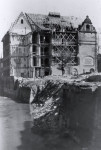
Severe damage to the building meant that it was not possible to continue teaching there after the Second World War. As a consequence, the College initially reopened only partially, offering a small number of public lectures at alternative locations. The men of the hour were Eduard Brenner, the first new rector of the College and of FAU, and Georg Bergler, who re-established Gesellschaft für Konsumforschung with Wilhelm Vershofen. The name that the College had been given during the National Socialist era was changed back to Nuremberg Commercial College in 1946. Teaching began again in the winter semester of 1946/47 in the local hospital’s gynaecology department and in the school on Adam-Kraft-Straße. The College did not move back to Findelgasse 7 until reconstruction was completed in 1952. The building was extended with a new building at Findelgasse 9 in 1955.
1961 – The College is incorporated into FAU
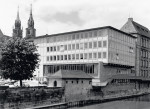
In order to strengthen research and teaching, the College was incorporated into FAU on January 1, 1961 while keeping its location in Nuremberg, and became the University’s sixth faculty at the time. At the same time, the University’s name had ‘Nürnberg’ added to it, resulting in its current name, Friedrich-Alexander-Universität Erlangen-Nürnberg. The number of students at the university increased dramatically at the beginning of the 1960s and continued to do so until the end of the century.
Since 1975 – Global networks, local connections
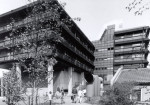
The School places great importance on being international and interdisciplinary. Its focus on these two aspects has developed continuously since 1975. Research is another key priority at the School. Since the 1980s it has been a leader in information systems. An interdisciplinary Diplom degree program in information systems was introduced in 1991. The School’s international focus was emphasized with the introduction of the Erasmus program in 1993, which promotes the exchange of students between the School and other universities in Europe. In addition, the School introduced Germany’s first international business studies degree program in 1997.
2001 – The School grows

In 2001, construction work began to increase the size of the School’s premises at Lange Gasse. The new building with two new lecture theaters, computer rooms and additional space for offices was completed in 2004. The School was also able to renovate lecture theater H3 with the help of GfK. But it was not just the School’s buildings that grew in 2004 – the range of degree programs was also expanded with the MBA degree program for professional development in Business Management.
2014 – By students for students: the first Ludwig Erhard Symposium
The first Ludwig Erhard Symposium, the topic of which was ‘Successful and Sustainable Practice in the World of Tomorrow’, was held in the winter semester of 2014/15. Renowned representatives from industry and research gave talks at the event on October 9 and 10, 2014 at NürnbergMesse. The School of Business and Economics plays a key role in the symposium, as its students are responsible for a large amount of the organization of the event.
2015/16 – Make the most of the opportunities available: study at the School of Business and Economics
Another degree program, the Master’s degree program in Health Management and Health Economics was added in the winter semester of 2015/16. Having started as a college with a small number of students, the School of Business and Economics now has over 6000 students enrolled in more than 20 degree programs, including professional development programs, which are organized by 44 professors and various research and administrative staff. In addition, students are supported by a wide range of services, such as the Career Service, the Computer Center and the International Office, making the School of Business and Economics one of the top places to study in the Nuremberg Metropolitan Region.
2019 – 100 years WiSo Nuremberg
Commemorating 100 years of history: The School of Business, Economics and Society is celebrating its anniversary in 2019. We are looking forward to celebrating 100 years of history, how the School has grown and developed over the years, and our close links to the city of Nuremberg with many exciting events in our anniversary year 2019.